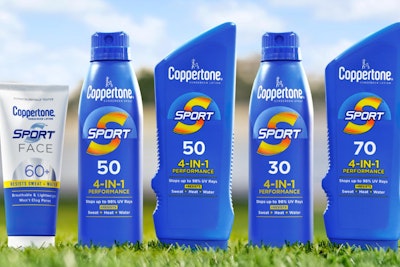Coppertone
Sunscreen and tanning lotions

Coppertone's Sustainability Rating
Insufficient
Ingredients
Coppertone doesn't make any brand-level commitments related to its ingredients. Choice of ingredients is a strong determinant of environmental impact. Its parent company, Beiersdorf, discloses that it abides by EU ingredient regulations, which are often viewed as stringent. It additionally commits to reducing select harmful ingredients such as uncertified palm oil, microplastics, and nonbiodegradable polymers. Coppertone uses ingredients that pose a significant threat to the climate, including microplastics, reef-harming suncare ingredients and other petrochemical-based ingredients. Coppertone doesn't report having any product or company-level certifications.
Containers & Packaging
Coppertone doesn't share anything about its packaging at a brand-level. Its parent company, Beiersdorf, shares overall efforts to minimize the amount of material used in its product containers and packaging, including lightweighting, but it's unclear what is relevant to Coppertone. It has some goals to decrease virgin plastic in its packaging, but it fell short of its initial deadline and doesn't appear on track for its new one. Beiersdorf is working to reduce its shipping emissions by shifting from air to ocean freight.
Energy & Water Use
Coppertone's parent company, Beiersdorf, shares information on its overall energy strategy. It uses some renewable energy to power its production sites and corporate offices, and has general targets for expanding its use of renewable energy with suppliers. It also implements energy efficiency measures in its production sites and corporate offices, but doesn't provide specifics. Beiersdorf implements water conservation measures, including setting water reduction targets, conducting annual 3rd-party audits, and installing water reuse technology. Coppertone has a global production span, which is standard for the industry.
Refill & Reuse
Coppertone doesn't utilize any alternative models or methods to avert waste.
Slow Cleaning
Coppertone offers frequent releases, which can encourage overconsumption and production of excess inventory.
Marketing
Commons is still evaluating this brand's marketing emails.
Transparency & Reporting
Coppertone doesn't appear to have a sustainability page or centralized source of relevant information. It doesn't provide customers with any links to its more comprehensive parent company site. Its parent company, Beiersdorf, publishes a detailed annual report with a clear, impact-driven strategy and progress reporting. Its last annual report was published in 2023. Coppertone doesn't share a complete list of ingredients used in its products. We expect more transparency from brands.
Emissions Tracking
Coppertone's parent company, Beiersdorf, internally measures and publicly reports its company-level emissions in partnership with, or with auditing from, a third party. It includes a breakdown by scope, though it only reports on select scope 3 categories. The last reporting period was 2023. In this most recent update, its estimated emissions footprint was 2,195,426 tons CO2e.
Targets & Offsets
Coppertone's parent company, Beiersdorf, has SBTi-approved emissions reduction targets for the medium-term (5-10 years) and long-term (10+ years). It has reported on its progress within the past year, and is on track for all of its medium-term targets. Commons couldn't verify that this brand offsets any emissions, but Beiersdorf has shared plans to use carbon removal solutions, potentially in the future.
Supply Chain & Labor
Coppertone's parent company, Beiersdorf, doesn't publish information about its supply chain partners. It traces some of its supply chain, achieving almost 100% palm oil traceability. It publicly shares a supplier code of conduct, which prohibits forced labor, prohibits child labor, ensures the right to collective bargaining, and includes environmental clauses. Its code of conduct doesn't disallow unauthorized subcontracting, ensure a living wage, or establish grievance mechanisms. Beiersdorf doesn't have a stated policy of regularly auditing its supply chain partners, though it does annual assessments and followup audits for higher risk partners.
Advocacy
Coppertone's parent company, Beiersdorf, discloses all of its trade association memberships, including those that are climate-obstructive. It's a member of 1 large climate-obstructive trade associations: Personal Care Products Council. Beiersdorf isn't a member of advocacy organizations advancing climate policy. It doesn't employ any state lobbyists and didn't donate more than $100k to climate-obstructive candidates or PACs from 2018-2024.
Coppertone has a Insufficient rating due to an overall lack of sustainability efforts and disclosures at the brand-level. We expect more reporting and transparency from a brand of its size.
Coppertone doesn't make any commitments related to its ingredients and it doesn't publish a list of ingredients for each product or provide an overall list online. Choice of ingredients is a strong determinant of environmental impact, and this non-disclosure is rare, since consumers need access to this information for safety and allergy determinations. Commons found evidence of climate-threatening ingredients in Coppertone products, including microplastics, reef-harming suncare ingredients, and other petrochemical-based ingredients.
Coppertone's parent company abides by EU regulations and is working to improve its ingredients, though it's unclear which initiatives apply to which brand. Coppertone uses primarily plastic packaging of a virgin or undisclosed source, which contributes greatly to waste production and excess energy use. Its parent company publicly shares its emissions and has SBTi-approved reduction targets which are on track.
Coppertone is owned by Beiersdorf.
Our ratings are based on a scale from 1 (bad) to 5 (best). How we rate →
https://www.beiersdorf.com/sustainability/reporting/sustainability-reporting/nfe-2024#page=41
https://echa.europa.eu/substances-restricted-under-reach https://www.chemradar.com/tools/cis/inv/64924ab5e7fff39f787f1b10
https://www.beiersdorf.com/~/media/Beiersdorf/sustainability/reporting/downloads/policies/Beiersdorf-Environmental-Policy.pdf
https://www.beiersdorf.com/sustainability/environment/sustainable-land-use/palm-oil https://www.beiersdorf.com/~/media/Beiersdorf/sustainability/reporting/downloads/Sustainable-Palm-Policy_updated.pdf
https://www.beiersdorf.com/~/media/Beiersdorf/sustainability/reporting/downloads/Beiersdorf-Climate-Transition-Plan-June-2024-November.pdf
https://www.beiersdorf.com/sustainability/environment/fully-circular-resources/packaging
https://www.beiersdorf.com/~/media/Beiersdorf/sustainability/reporting/downloads/Beiersdorf-Sustainable-Paper-and-Cardboard-Policy.pdf
https://www.beiersdorf.com/sustainability/reporting/highlights-2024
https://sciencebasedtargets.org/target-dashboard
https://www.beiersdorf.com/sustainability/environment/sustainable-land-use/palm-oil
https://www.beiersdorf.com/~/media/Beiersdorf/sustainability/reporting/downloads/Beiersdorf_2023_CoC_for_Business_Partner.pdf
https://www.beiersdorf.com/sustainability/our-commitment/memberships-and-collaborations
https://fminus.org/lobbyists/
https://www.fec.gov/data/browse-data/
Get Rewards
Earn for sustainable purchases
Commons rewards you for sustainable purchases from all our Top Rated brands, plus thousands of everyday purchases — from thrift stores to public transit.
Learn more about rewards ->







